
A few of our favorite camping slippers in their happy place. Photo: Steve Andrews//The Inertia
At the end of a long day out in the wild, there is nothing like getting back to camp and taking off your hiking boots, ski boots, or surf booties, and placing your tired dogs somewhere comfortable to rest before the shenanigans of tomorrow. When an otherwise action-packed day winds down around a fire or in a tent, a good pair of camping slippers makes a great day remarkable.
That said, with so many different options online, not every slipper you can find will be great for the campsite, tailgate, beach bonfire, or wherever you may take them. So we got our hands on the most comfortable, rugged, and stylish outdoors-slippers we could find, and put them through the wringer to see if they have what it takes to be a good camping slipper. We took them to the forest, the beach, and also just around home to see what they are made of. Namely, will they keep your feet happy, are they easy to use, and will they stand the test of time? Below are the styles that rose to the top.
Navigate To: Comparison Table | Buyer’s Guide | Best Car Camping Gear
Editor’s Note: We updated this guide in November 2024 with a couple of new picks, updated navigation, and refreshed links.
The Best Camping Slippers of 2025
Best Overall Camping Slippers: Teva ReEmber
Best Budget Camping Slippers: Cobian Happy Camper Mule
Best Traction Camping Slippers: Hoka Kaha 2 Frost Moc GTX
Best Un-Insulated Camping Slippers: Lems Drifter Slip-Ons
Most Durable Camping Slippers: Blundstone Premium Leather Clogs
Best Camp Booties: The North Face ThermoBall Traction Bootie
Best Winter Camp Booties: Feathered Friends Down Booties
Best Overall Camping Slippers
Teva ReEmber ($80)
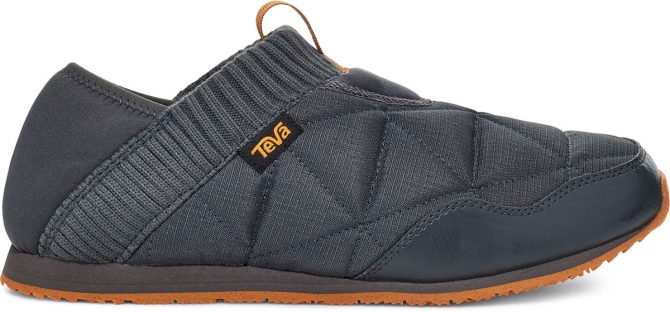 Upper Material: Recycled ripstop
Upper Material: Recycled ripstop
Outsole: 50% Recycled rubber
Insulation: Recycled microfiber
Pros: Durable construction, recycled materials, form-fitting
Cons: No fuzzy insulation
Teva’s ReEmber camp shoes are a bit less slipper and a bit more versatile camping/vanlife slip-on, but that doesn’t mean they are any less awesome. Recycled materials are used throughout, meaning these are a great pick for those who want to tread lightly on Mother Earth, the heel folds down so you can slip your foot in, and can be folded back up for “sport mode,” the slippers are relatively packable, and so far, super durable.
When we think of slippers, some sort of fuzzy insulation tends to be the norm, but the lack of it in the Teva ReEmbers makes these slippers incredibly versatile for all-day wear, sandy or dirty environments that would do a number on some cozy fuzz, etc. And even without the fuzzy insulation, these are plenty warm for slip-ons. For a bit more coziness, the Teva ReEmber Terrain Mid brings a mid-height upper, sacrificing the slip-on ease in exchange for warmth.
Check Price on REI Check WOMEN'S Price on Backcountry Check WOMEN'S Price on Amazon
Best Budget Camping Slippers
Cobian Happy Camper Mule ($24.95)
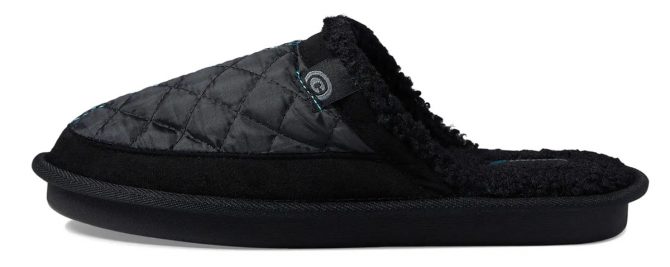
Upper Material: Quilted Nylon
Outsole: TPR
Insulation: Sherpa fur
Pros: Well-made and comfortable for a great price
Cons: No heel is great for slip-on ease, but less ideal for more active pursuits
For a pair of slippers that won’t break the bank, you can’t beat the Cobian Mule line. The Happy Camper faux-fur slippers are super cozy, and the lack of a heel provides slip-on ease for on-the-fly changes at the cost of some mobility.
And while the low price point may make you think “overseas conglomerate,” you’ll be stoked to know that your dollars are going to a small, family-owned California business with a surfer-ethos to boot. Cobian has been making slippers and sandals for the past 25 years, with support from surfing legends like Bethany Hamilton, Nate Yeomans, and Jeff Clark.
Best Traction Camping Slippers
Hoka Kaha 2 Frost Moc GTX ($200)
Upper Material: Recycled Ripstop Polyester and Textile
Outsole: Vibram Megagrip
Insulation: PrimaLoft
Pros: Excellent Vibram outsole with loads of traction, warm and waterproof upper
Cons: Expensive, overkill for casual use
The Hoka Kaha 2 Frost Moc GTX is a recently released camp slipper and we’ve not wanted to take them off—they’re that good. With one of our favorite outsoles in the biz (the Vibram Megagrip that is), and a warm PrimaLoft and Gore-Tex waterproof upper, these camp slippers are more like hiking slippers. And that’s why they didn’t quite unseat our top pick, the Teva ReEmber: The Hoka Kaha 2 Frost Moc GTX, while amazing, is pricey and performance-oriented, and they fit a bit more specialized crowd.
We’ve been testing these around rocky Arizona campsites, where nighttime temps easily dip down to freezing, and the ground is uneven and littered with catclaw, loose rock, and cholla. So far, the Kaha 2 Frost Moc has performed admirably: From morning dog walks on forest roads to middle-of-the-night bathroom breaks, these camping slippers provide an awesome combination of traction, warmth, and waterproofing. They are overkill for a lot of users just looking for comfy shoes around camp, and we wouldn’t recommend packing these in a backpack. But for dispersed camping with lots of uneven terrain and winter walking, this slipper from Hoka is tough to beat.
Check Men's Price on REI Check Women's Price on REIBest Un-Insulated Camping Slippers
Lems Drifter Slip-Ons ($95)
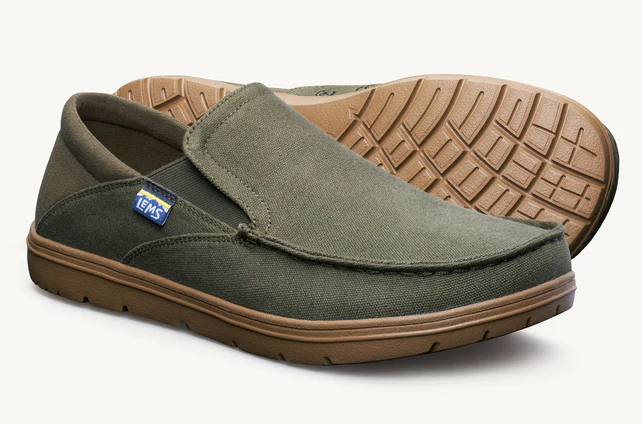
Upper Material: Cotton and Microfiber
Outsole: Rubber
Insulation: None
Pros: Durable, lightweight slip-ons, perfect summer “slippers”
Cons: Not very helpful in the warmth department
Lems, a small footwear company out of Boulder, Colorado, has been making a name for themselves in the outdoors industry with their zero-drop footwear, designed to provide a barefoot feel when walking. The Drifter is one of their most casual styles, with a comfortable closed-toe design, moisture-wicking and breathable canvas upper, and roomy fit. The shoes have a collapsible heel like many others in this review, and a comfortable cork insole.
While their lack of insulation makes them a bit less of a true camp slipper, these shoes layer well with socks for when nights get chilly, and with that lack of insulation are a bit more versatile during summer months.
Most Durable Camping Slippers
Blundstone Premium Leather Clogs ($174.95)
Upper Material: Premium Leather
Outsole: Rubber
Insulation: None
Pros: Durable and well-made, great outsole and midsole, warm for non-insulated
Cons: Expensive, not the most stylish for everyday use
We got the Blundstone Premium Leather Clogs by accident, and we’re glad we did: These high-quality clogs make super durable and comfortable camping slippers. They are of the easiest on this list to slip on and off, and the premium leather upper provides surprising warmth despite it being uninsulated. Plus, Blundstone’s quality, waterproofing, and comfortable midsole/outsole rubber shine through even in the clogs, and these should last you years to come.
The Premium Leather Clogs are some of our favorite everyday slippers, and they crossover readily from camp to town, so for those casual trips, these Blundstones work perfectly. Because they provide excellent waterproofing and durability, we’ve been using these for fall camping and they have held up well. Damp mornings can sog your puffy camp slippers, but the thick leather upper of the Blundstone clogs protected our feet even in intermittent rain. With durability comes a price, and in this case, that’s the literal price. These are on the expensive side for slippers that are somewhat limited in their versatility. That said, if you want a bomber camping slipper that will last for years, these are our top pick.
Check Price on REIBest Camp Booties
The North Face Thermoball Traction Booties ($69)
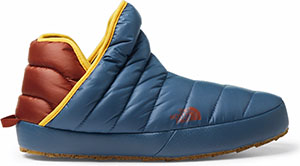
Upper Material: Recycled PET ripstop
Outsole: 40% Recycled rubber
Insulation: ThermoBall eco insulation
Pros: Great insulation, lightweight, recycled materials
Cons: Thick sole makes it less packable than you would think
Down booties are a favorite for many due to their lightweight nature, but the problem with down is that when it gets wet, you lose the warmth. But the Thermoball Traction Booties from The North Face give you the feel of a down bootie with the added bonus that they can get wet and still stay warm thanks to their Thermoball Eco insulation. Add in a solid outsole that holds up well outside, and this is a warm and comfy option for people who want that sleeping bag feeling on their feet.
Check Price on REI Check Price on Amazon
Best Winter Camp Booties
Feathered Friends Down Booties ($119)
Upper Material: Pertex Endurance shell fabric
Outsole: Durable, waterproof
Insulation: 800 fill power goose down
Pros: Ultralight, super warm, removable insulated inner booty
Cons: Not durable enough to wear as a shoe, pricey
The Feathered Friends Down Booties are a versatile camp shoe that can be used to provide extra insulation for cold nights on the trail. These booties are equipped with two layers, a waterproof sole on the outer shell, and 800-fill power, ethically sourced goose-down inner bootie. These camp shoes are best for providing added insulation when you’re hitting the woods on cooler nights. The outer shell is not intended to be worn as a shoe but is designed to give you an added waterproof sole and outer layer so that if you need to leave your tent at night you can be assured that the inner layer won’t get wet.
These booties are great bonus gear to bring along if you’re looking for an ultralight way to keep your feet super toasty on the cooler nights outside. Whether you’re hiking a long-distance trail or car camping in colder weather, these booties will keep your feet warm. Although these booties are great at keeping our feet warm, and the added outer layer is a wonderful feature if you’re looking to take a quick trip outside on dew-soaked terrain, they are not the type of footwear you can wear around camp as shoes, which is one of the cons for the Feathered Friends Down Booties. We would consider them a luxury item for backpacking trips because they are not sturdy enough to serve as true camp shoes to be worn around doing camp chores.
Our tester tried these booties out on cooler mornings where they kept our feet warm and in a warmer indoor setting to determine if they would make our feet sweat (which they didn’t). We love that they are able to be clipped tighter around our ankles and that the outer shell can also be cinched down to hold them onto our feet.
Check Price on Feathered FriendsBest of the Rest
Danner Forest Moc ($169.95)
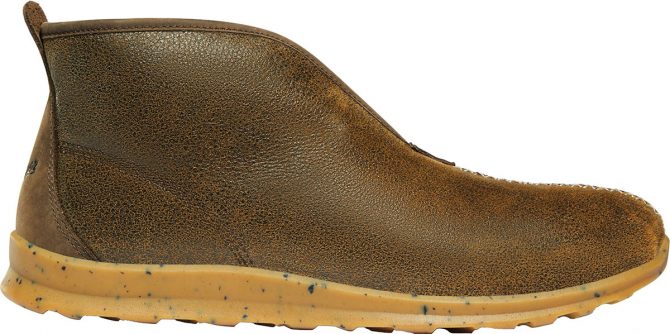
Upper Material: Shearling
Outsole: Rubber
Insulation: Shearling
Pros: Well made, thick outsole
Cons: Pricey, leather insole can get sweaty
Danner has a great reputation for well-made outdoor footwear. Their hiking boots were favorites in our reviews of both Men’s Hiking Boots and Women’s Hiking Boots. In the slipper department, the Forest Moc does not disappoint. With a shearling upper and leather insole, it looks swanky with a great fit that only gets better with time. It’s pricier than other camp slippers, but these will last long and be useful in more venues than camping. Being leather though, it might not be the best for those with sweaty feet or for romping around the desert. That said, even on a hot day it felt as though moisture didn’t really collect. With one of the thickest outsoles we tested, this has the potential to be a lot more than a slipper, being a great fusion of comfort and stability.
Olukai Kīpuka Hulu Slipper ($130)
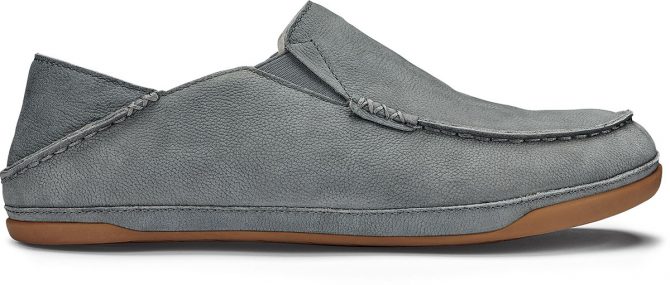
Upper Material: Nublock Leather
Outsole: Rubber
Insulation: Sheepskin
Pros: Supremely cozy, with good looks to match
Cons: A bit roomy, reducing performance potential
Olukai’s Kīpuka Hulu Slippers are some of the coziest slippers we’ve tried. A soft shearling lining makes these slippers a joy to put on, and a wider fit means your toes are free to wiggle as they please. A collapsible heel is par for the course. The slippers also simply look great, coming in four different shades of premium leather. That being said, they were a bit roomy, reducing the potential for more physical use. That said, the sole, a nice grippy rubber, certainly stands up to outdoor abuse.
Olukai also sent us a pair of their Mahana Slippers, which are made with a cotton upper and terrycloth lining for a bit more all-season breathability, as well as a narrower fit, improving performance potential. They’re not as cozy as the Kipuka Hulu’s but they are certainly a more versatile option from the legendary footwear brand.
Buy Men's on Olukai Check Price on Amazon
Glerups “The Boot” ($154.95)
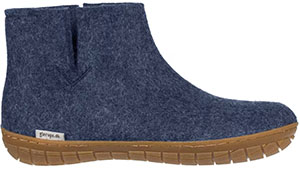
Upper Material: Wool Felt
Outsole: Rubber
Insulation: Same as upper
Pros: Warm. light, and comfortable
Cons: Not much traction compared to others
Glerups is a Danish brand that started 30 years ago in Peter and Hanne Glerup’s home as a hobby, using wool from the sheep in her backyard. Over time the slippers gained a huge reputation for checking all the right boxes and now have gained worldwide popularity, and it’s easy to see why. These slippers are a joy to put on and can be worn outside thanks to the rubber sole, but are equally comfortable at home thanks to the outsole not being too thick.
The beauty of these is in their simplicity: Wool on top, rubber on bottom and that’s it. But the wool is naturally insulating, moisture-wicking, and oh-so-comfortable. We liked The Boot for a bit of extra warmth but they also come in a lower-cut “The Shoe” model, as well as Slip-On if you aren’t into using your hands.
Check Price on Backcountry Check Price on Amazon
Lâmo APMA Slide Wrap ($99)
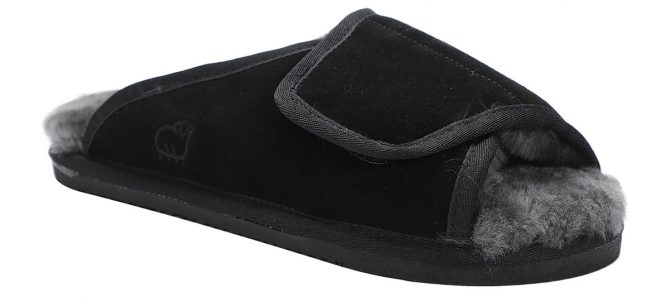
Upper Material: Suede
Outsole: TPR
Insulation: Sheepskin
Pros: Sheepskin liners, thick outsole
Cons: Open design can be more prone to getting dirty
Slide slippers are great for those who like to move in and out from time to time, or want the freedom of a flip-flop with a bit more coverage. The APMA slide wrap takes it a bit further and adds a sheepskin liner to give you optimum comfort. The only slipper on our list that is certified by the American Podiatric Medical Association (APMA), this slipper has a nod for promoting good foot health. While that’s not a huge decision factor for this review, some folks (especially diabetics and those with foot issues) may be pleased to know since slippers aren’t often the best for circulation.
Comfort-wise, the sheepskin liners are thick and plush and feel great. They also wick moisture and regulate temperature. You probably don’t want these in really cold climates as it keeps the toes exposed. But if you’re buying a wrap, you probably know what to expect. For slip-on comfort, we didn’t find much that could match the feel of these.
Check Price on Amazon Check Price on Lamo
Crocs Classic Clog ($50)
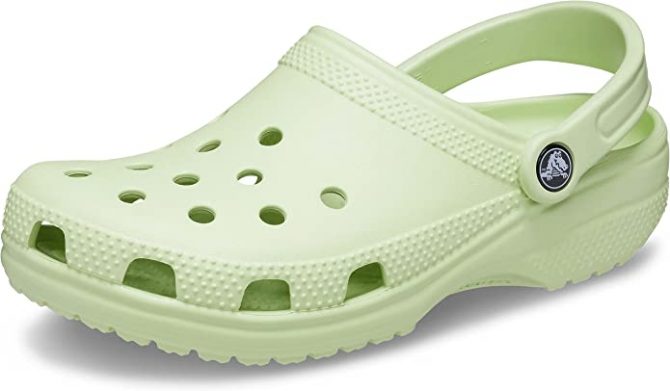
Upper Material: PEVA
Outsole: PEVA
Insulation: None
Pros: Comfortable, multi-purpose, and now somehow stylish
Cons: Open design lets dirt/dust in, no insulation or support
Crocs? In a review of camping slippers? Yup. While they might stretch the definition of camping slippers about as far as it goes, We’d argue that when it comes to comfortable footwear to slip on around camp, you’d be hard-pressed to find a better option than the Classic Clog, especially as summer rolls around. They won’t keep your feet warm, but add a pair of thick and cozy socks, and unless you’re winter camping, your feet should be plenty warm. That said, the classic rubber clog has also seen many different variations over the years like the Lined Croc or the Neo-Puff Croc, which just might provide the insulation you’re looking for.
And for summer camping adventures, Croc’s Classic Clog might be the sleeper top pick on this list. Besides being an awesome camp slipper, they also double as a water shoe, can stand up to a decent bit of activity when “sport mode” is activated, and have recently seen a surge in popularity for reasons that are quite simply beyond us, but we’re also totally here for.
Check Price on Backcountry Check Price on Amazon
Danner Jag Loft ($120.65)
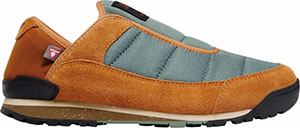
Upper Material: Suede/Textile
Outsole: Winterized Rubber
Insulation: 200g Primaloft
Pros: Great insulation and traction for winter
Cons: Pricey. Low-cut means you’ll need socks when it’s cold
If warmth is paramount to your decision, then allow us to introduce you to Danner’s Jag Loft. Like other Danner footwear, it’s made well and built to last, with added style points as well. But the distinguishing feature here is the 200g PrimaLoft insulation. If you’re familiar with PrimaLoft, you’ll know it’s incredibly warm while still having enough breathability to keep sweat from ruining your day.
These slippers probably would have been a higher pick if they had a bit more above the ankle. While it’s great in the cold, we found ourselves needing socks on to really enjoy it in the winter, which kinda defeats the purpose for some. Or maybe we just have wussy ankles. But that said, it’s got a collapsible heel for easy slip-on-ability, and if you’re a sock person anyway maybe that’s not a dealbreaker. Even still, warm toes are more valuable than warm ankles so maybe the trade-off is worth it here.
Buy Men's on Amazon Buy Women's on AmazonLâmo Doubleface Romeo ($84.95)
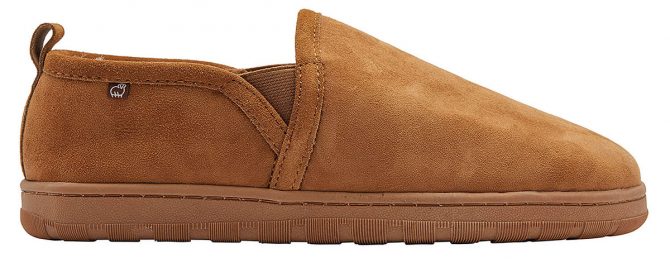
Upper Material: Doubleface sheepskin
Outsole: Rubber
Insulation: Sheepskin
Pros: Sheepskin liners provide optimum comfort and breathability
Cons: Needs a bit more TLC than synthetic materials
Lâmo makes some great footwear, and their signature sheepskin liners do not disappoint. With a thick rubber outsole, the Romeo slippers are great outside or inside and will provide long-lasting comfort even if you’re on your feet for a while. Lâmo recommends sizing up a whole size, and even when doing that, they still fit snugly on the feet. They say that over time it stretches and adapts to the foot for an even better fit, and we can vouch to say that even though they were comfortable out of the box, it just got better the longer they stayed on. Sheepskin can help keep you warm when it’s cool, and cool when it’s warm and wicks moisture to help keep sweat from becoming much of an issue.
The sheepskin definitely needs more TLC than other materials to last long and stay looking good, so if you’re the type of person who likes a rough-and-tumble slipper to brave the elements this might not be the best choice. It’s definitely more for the cabin than the campsite but that said, the comfort of sheepskin makes this a great choice if you’re willing to put effort into maintaining them.
Check Price on Amazon Check Price on Lâmo
Sanuk Cozy Vibe Low ($85)
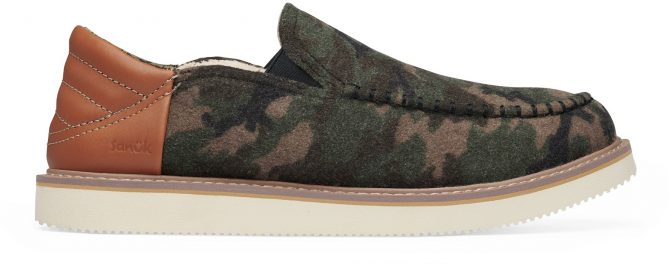
Upper Material: Hemp/Cotton/Leather
Outsole: Sugarcane EVA/EVA
Insulation: Wool/Polyester
Pros: Durable sole, recycled materials
Cons: A bit chunky
Cozy is the name of the game with the Sanuk Cozy Vibe slippers. These indoor/outdoor slippers are made with a wool-blend lining that will keep your toes warm when it’s cold and are moisture-wicking to boot. Removable footbeds allow for ease of sand removal, and Sanuk’s commitment to the environment and use of recycled and sustainable materials in these slippers provide ease of mind while online shopping.
Camping Slippers Comparison Table
| Model | Price | Upper | Insulation | Features |
| Teva ReEmber | $75 | Recycled Ripstop | Recycled Microfiber | No fuzz |
| Cobian Happy Camper Mule | $40 | Quilted Nylon | Sherpa Fur | Great price |
| Hoka Kaha 2 Frost Moc GTX | $200 | Recycled Ripstop | PrimaLoft | Excellent traction, warm |
| Lems Drifter Slip-On | $95 | Cotton/Microfiber | None | Barefoot feel, breathable |
| Blundstone Premium Leather Clogs | $175 | Premium Leather | None | Durable and comfortable |
| The North Face Thermoball Traction Bootie | $69 | Recycled PET Ripstop | Thermoball | Mostly recycled materials |
| Feathered Friends Down Booties | $119 | Pertex Endurance | 800 fill goose down | Removable insulation and foam midsole |
| Danner Forest Moc | $170 | Shearling | Shearling | Leather upper and insole |
| Olukai Kīpuka Hulu | $130 | Nublock Leather | Sheepskin | Supportive insole |
| Glerups “The Boot” | $155 | Wool Felt | Felt | Easy to slip on/off, moisture-wicking |
| Lâmo APMA Slide Wrap | $99 | Suede | Sheepskin | APMA certified for foot health |
| Crocs Classic Clog | $50 | Plastic | None | They’re Crocs |
| Danner Jag Loft | $170 | Suede/Textile | PrimaLoft | 200g PrimaLoft Insulation |
| Lâmo Doubleface Romeo | $98 | Doubleface Sheepskin | Sheepskin | Memory Foam insole, sheepskin liner |
| Sanuk Cozy Vibe Low | $85 | Hemp/Cotton/Leather | Wool/Polyester | Recycled materials |

We tested the best camping slippers in a variety of locations, from the beach to the forest, around town, and more. Photo: Will Sileo//The Inertia
How We Tested Camping Slippers
Testing camping slippers requires the very important act of going camping and keeping those feet warm. We’ve been testing dozens of pairs for the past three years in a variety of environments. Gear Editor Will Sileo lives in the Bay Area, where the foggy mornings on the beach require a bit of toe warmth after a good, cold surf. He also spends ample time in the Sierra Nevada mountains, where warmth and traction are of even more importance.
Steve Andrews lives in the Coast Mountains of British Columbia, where the damp climate has even more need for warm toes in a variety of conditions. The rugged terrain also requires a durable outsole and the rock, roots, and dirt are a great venue for testing how the slippers felt throughout the varying temperatures of the day.
Rebecca Sperry is an avid outdoorsperson who lives in the northeast, and tested slippers in cold camping situations.
Nathan Lemin also contributed testing on the latest update, while cold weather camping in high-elevation Arizona and California.
We based our reviews on each slipper’s ability to brave the elements as opposed to indoor shoes – can they take a walk outside and not fall apart? Safe to say, all the slippers on this list do. We also rated the ability to keep feet warm (with the exception of the non-insulated versions we discussed), and whether or not they were breathable enough to not overheat the feet.
Everything we have listed will be a great slipper and ultimately will depend on your needs. To help you dial that down further, read on for our Buyer’s Guide.

The Boot by Glerups rests well above the ankle for wintertime comfort, indoors or outdoors. Photo: Lindsay Gough//The Inertia
Camping Slippers Buyer’s Guide
Material: The material of your camping slippers plays a pivotal role in comfort and durability. Look for slippers with a sheepskin liner for optimum comfort and breathability, ideal for cooler climates. For warmer conditions, materials like moisture-wicking wool blends keep your feet dry and comfortable. If sustainability is your priority, seek out slippers made from recycled materials.
Insulation and Breathability: Balancing insulation and breathability is key, especially if you’re camping in varying temperatures. Look for slippers with natural insulating properties that also offer breathability. This will keep your feet warm during chilly nights and prevent them from overheating during the day. On the contrary, if you’re a fairweather summertime camper, too much insulation might be overkill.

The Feathered Friends Down Booties are the warmest we tested, but they have a removable liner for versatility. Photo: Rebecca Sperry//The Inertia
Convenience and Portability: For backpackers, weight and portability are crucial. Slippers that are lightweight and can be easily packed or attached to a backpack are ideal. Some slippers even come with features like zip-together functionality and included carabiners for effortless transportation.

With more tread than your average slipper and 200g PrimaLoft insulation, the Jag Loft by Danner is a fine choice for cozy outdoor comfort any time of year. Photo: Lindsay Gough//The Inertia
Sole: An essential aspect of a good camping slipper is the sole. A thick rubber outsole provides durability and is suitable for both indoor and outdoor use. For those planning to venture beyond the campsite, consider slippers with a grippier sole for extra traction. A good sole doesn’t just protect your feet but adds to the slipper’s lifespan.

The Hoka Kaha 2 Frost Moc GTX provided unbelievable comfort and traction. Photo: Nathan Lemin//The Inertia
Support and Comfort: Never compromise on comfort. Slippers with a collapsible heel offer ease of slipping on and off, while a cushioned footbed provides the necessary support for your feet.
Style and Versatility: Who says camping slippers can’t be stylish? Choose a pair that reflects your personality. From the unique look of the Forest Moc to the simplicity of the Slide Wrap, there’s a style for every camper. Plus, some slippers are versatile enough to double as water shoes or be suitable for light activities.

The Feathered Friends Down Booties have a removable liner for added versatility. Photo: Rebecca Sperry//The Inertia
Maintenance: Consider the maintenance your slippers will require. Natural materials like sheepskin may need more care than synthetic ones. If you prefer low-maintenance footwear, opt for slippers made from materials that are easy to clean and quick to dry.
In the end, the best camping slipper is the one that suits your preferences for style, environment, comfort, and warmth… or all of the above. Whatever piece you choose will surely be a treat for the feet and allow for a nice way to unwind after a day of adventuring, wherever and however that may be.
Editor’s Note: For more gear reviews and features on The Inertia, click here.
Return to Top Picks | Return to Comparison Table | Return to Buyer’s Guide




